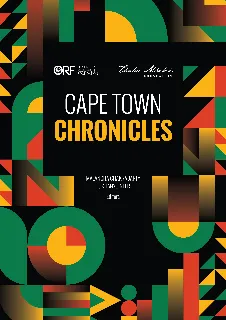Introduction
After a long spell of high growth, declining poverty, and relative economic stability in the last two decades, Africa once again finds itself mired in debt and conflict, and facing bleak economic prospects. The achievement of the Sustainable Development Goals (SDGs) has suffered a reversal in most African countries due to the COVID-19 pandemic, lockdowns, supply chain disruptions, and the Ukraine-Russia war. Yet, despite the serious setback, most forecasts still regard Africa as a growth frontier of the world owing to its young and growing population and natural resource endowments. According to World Bank estimates, Africa’s GDP will grow at 3.6 percent in 2023, and at 3.9 percent in 2024; 91 percent of Africa’s economies will grow above the global forecast of 1.7 percent in 2023.[1]
Despite a collective GDP of US$3.1 trillion and a population of 1.3 billion, the continent remains marginalised in global governance institutions. Africa has no clout in the workings of key global institutions like the United Nations, the International Monetary Fund, and the World Bank. Barring South Africa, no other African country had ever been a member of the Group of Twenty (G20)—currently the world’s most influential forum for economic cooperation.
The G20’s engagement with Africa is slightly over a decade old. The first reference to Africa was made at the G20’s Toronto Summit in 2010 when the grouping promised financial support through concessional lending to the African Development Bank. Thereafter, infrastructure building and regional economic integration through trade facilitation was emphasised during the Seoul Summit in 2010.[2] A major initiative undertaken under the German presidency of 2017 was the G20 Compact with Africa, which called for the promotion of private investments in ‘reform-friendly’ African countries.[3]
Over the years, calls for a permanent seat for the African Union (AU) at the G20 grew louder. India, for one, actively pushed for a seat for the AU at the G20 and stressed the need for prioritising African concerns within the group’s agenda. India’s Prime Minister, Narendra Modi, wrote letters to G20 leaders to propose that they announce the AU’s full membership at the Delhi Summit, and in September, such an event did transpire.
The AU’s entry as a permanent G20 member is a welcome development. It increases the G20’s representativeness and legitimacy as a global body, while giving Africa a greater say in global issues like debt, climate change, and pandemic preparedness. Solomon Ayele Dersso, a legal scholar from Addis Ababa, has noted how the exclusion of Africa from the G20 tilted the balance in favour of creditor countries, and that in fact the failure of G20’s Common Framework for Debt Treatment was largely due to the lack of African representation.[4] Moreover, the AU can also facilitate an appreciation of Africa’s potential to play a leading role in green transition.[5]
Given the significance of the AU’s entry into the G20 and the continent’s aspirations, this compendium delves into Africa’s persisting development concerns amidst the lingering effects of the pandemic and the debt crisis. The essays outline plausible recommendations for the G20 to contribute to the achievement of Agenda 2063—Africa’s master plan towards becoming a global powerhouse.
In chapter 1, Pamla Gopaul explores the challenges before the AU and outlines the ways through which Africa can take on the agenda-setting role in matters of global importance rather than remaining a mere recipient of ideas, investments, finance, and technology from the rest of the world. Gopaul notes that the benefits of the AU’s membership will largely depend on how well the Union leverages its new status and influence. The AU will have to leverage its internal systems and build its own capacity to take full advantage of the opportunities that the G20 membership presents. Its existing departments like Agriculture, Rural Development, Blue Economy, and Sustainable Environment (ARBE), Economic Development, Tourism, Trade, Industry, Mining (ETTIM), Infrastructure and Energy, and Education, Science, Technology & Innovation (ESTI) will aid its new role in the Sherpa track while the President of the African Development Bank and the Bank’s board of governors will be key to representing the AU in the Finance Track of the G20. African think tanks and policy institutes will also need to contribute in supporting the AU to effectively represent Africa through their policy research.
Otaviano Canuto, Hinh T. Dinh, Karim El Aynaoui, Hafez Ghanem and Badr Mandri, in their piece, tackle Africa’s debt problem. While debt is a global issue, it needs special attention in the context of Africa as the region has a long and painful history associated with debt crises. A number of economists have compared the present debt build-up with the events of the 1980s, when structural adjustment programmes implemented by the Bretton Woods institutions created adverse impacts on the development goals of poor countries, including in Africa, due to massive expenditure cuts. In recent years, Africa’s debt levels have grown rapidly due to the economic fallout of the pandemic, the Ukraine-Russia war, increased borrowing to fund infrastructure projects, and the negative commodity price shock that reduced government revenues. The authors call for improved management of financial resources and more effective macroeconomic policies at the domestic level to prevent debt build-up. They argue that the African Financial Stability Mechanism (AFSM) governed by the African Development Bank (AFDB) could be an anchor for better macroeconomic management and a bridge between countries in distress, and the common framework. Further they posit that the development of deep and liquid local currency sovereign debt markets in Africa is essential and could boost involvement of the diaspora in closing the funding gap. African countries’ tax policies should also strike a balance between mobilising financial resources and broadening the tax base without constraining economic activity.
In the third chapter, Soumya Bhowmick and Nilanjan Ghosh focus on Africa’s economic marginalisation in the international order. They underline how the inherent biases in the system leave African countries facing higher borrowing costs than other regions of the world. The chapter notes how Basel III norms, supply-chain issues, gender biases in loan access, the COVID-19 pandemic, and higher rates of interest associated with Chinese loans have had adverse consequences for African countries in recent years. Therefore, the AU’s inclusion in the G20 should focus on helping the African cause and building a new financial architecture that will promote development in the continent.
Wandile Sihlobo and Tinashe Kapuya, in chapter 4, train the spotlight on Africa’s most intractable challenge of hunger and food insecurity—currently at an all-time high. African countries face complex challenges to food security, including short-term external shocks like the Ukraine-Russia war and the supply-chain disruptions due to the COVID-19 pandemic, and long-term issues such as low domestic priority to food security, poor agricultural productivity, conflict, high import dependency, and climate change. The authors suggest a range of policy options to drive agricultural growth in Africa: i) improvement in land governance; ii) creating a better policy environment through competition and merger regulations, tax incentives for SMEs, and a regulatory environment that promotes quality standards in input and output markets; iii) attracting long-term investment in agriculture; iv) addressing informality in Africa’s food and agriculture sector; and v) tapping into the Green Climate Fund (GCF) and leveraging global commitment to local delivery of adaptation finance. They also recommend a dedicated mechanism to address hunger and poverty in Africa within the G20, along with the provision of a special financial package.
In the fifth chapter, Lukhanyo Neer and Mandisa Mathobela emphasise the importance of integrating climate concerns into development pathways, given Africa’s disproportionate burden of climate repercussions despite minimal contribution to greenhouse gas emissions. According to the authors, the New Partnership for Africa’s Development (NEPAD) was a landmark event in the global development narrative because it was grounded in the ethos of mutual benefit and collaborative engagement between Africa and the broader international community, particularly the Global North. However, despite commitments on high-level diplomatic platforms, the North has largely failed to fulfill its promises. Further, the authors argue that the esoteric narratives of ‘climate justice’ and ‘sustainable development’ are in fact a lived experience of systemic injustice and lack of development for the African people. The authors call for a close scrutiny of the ‘just energy transition partnership’ to ensure that existing disparities are not widened and new forms of injustices are not created in the quest for clean energy. Lastly, the authors recommend a symbiotic partnership between the North and the South for a better future.
In the penultimate chapter, Elizabeth Sidiropoulos and Laura Rubidge note that Africa is extremely vulnerable to external shocks and the countries have made little progress in the implementation of the SDGs. Without deliberate policies and additional efforts, millions of African children will remain out of school and the continent would still be in extreme poverty in 2030. The annual investment deficit that needs to be closed to achieve the SDGs has widened rapidly. As a result, traditional development cooperation has become highly insufficient to realise the SDGs. Moreover, growing tensions between the United States and China and the Ukraine-Russia war have transformed development cooperation into an instrument for countries to pursue their strategic interests. The rise of the private sector in the development space has further complicated matters, creating a genuine risk of blurring the boundaries between development cooperation and purely economic activities. The authors assert that international cooperation in all its manifestations—viz. official development assistance, South-South and triangular cooperation, multilateral development finance, and private finance—will be crucial for Agenda 2030. Africa’s development needs must be highlighted at the UN Summit for the future and the first G20 year with the African Union as a full member.
The final chapter by Kwame Owino and Jackline Kagume discusses the problem of illicit financial flows (IFFs), to which Africa is susceptible due to differences in legal and institutional frameworks across countries. They argue that the weakest link in addressing IFFs is often the investigation stage, as the practice of corruption in key institutions compromises investigation against influential people. Moreover, most African countries have defined measures against IFFs in the context of counterterrorism which limits the scope for action as that leads to prioritisation of national security concerns over those related to fiscal leakage. IFFs have a negative impact on economic development and the welfare of citizens, even as their collective impact is less than 1 percent of the continent’s GDP. Therefore, while IFFs cannot be regarded as the biggest impediment to African development—at least in nominal terms—these outflows reflect the weaknesses in the countries’ political, regulatory, and financial systems. Strengthening the national systems of democracy to ensure political accountability and to build robust regulatory mechanisms and capable tax authorities should be an essential part of Africa’s development agenda.
For a long time, the global narrative on Africa was largely prescriptive: Africa was the problem that the world would try to cure. Today the global community knows better than to dismiss the countries in the continent as mere recipients of aid. There is greater awareness that solutions to global challenges—whether climate change, economic recession, conflict, inflation, or food insecurity—require collective action that should necessarily involve giving greater voice to the African people.
Read the report here.
[4] Solomon Ayele Dersso, Lea Mehari, "Why African Union’s membership in the G20 matters for both the G20 and Africa" Amani Africa, September 11, 2023.
[5] Solomon Ayele Dersso, Lea Mehari, "Why African Union’s membership in the G20 matters for both the G20 and Africa" Amani Africa, September 11, 2023
The views expressed above belong to the author(s). ORF research and analyses now available on Telegram! Click here to access our curated content — blogs, longforms and interviews.

 PDF Download
PDF Download



 PREV
PREV



